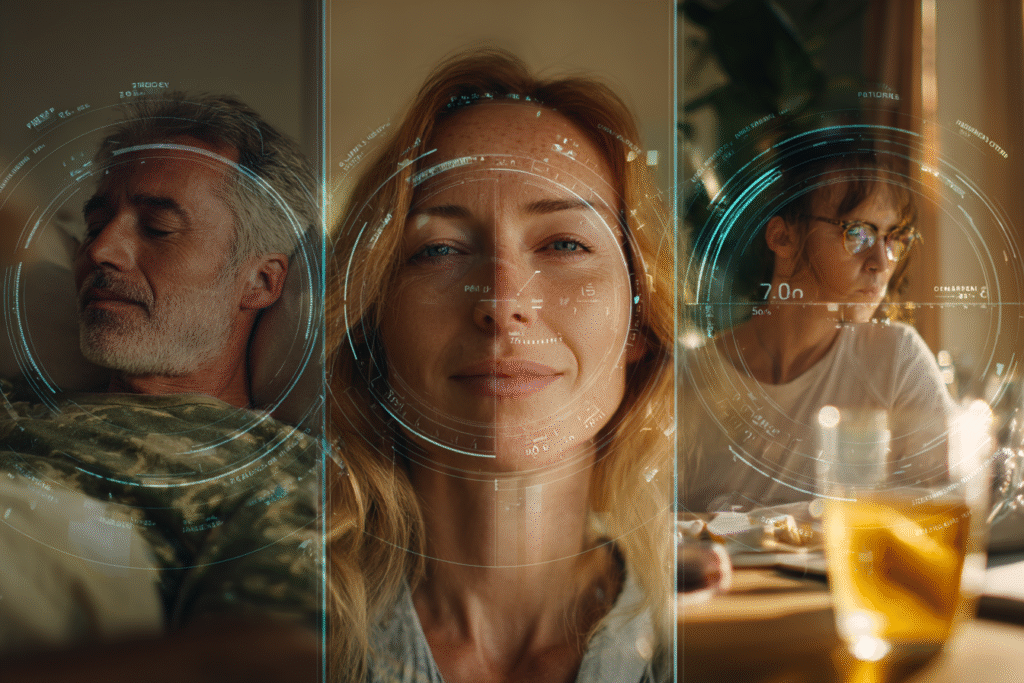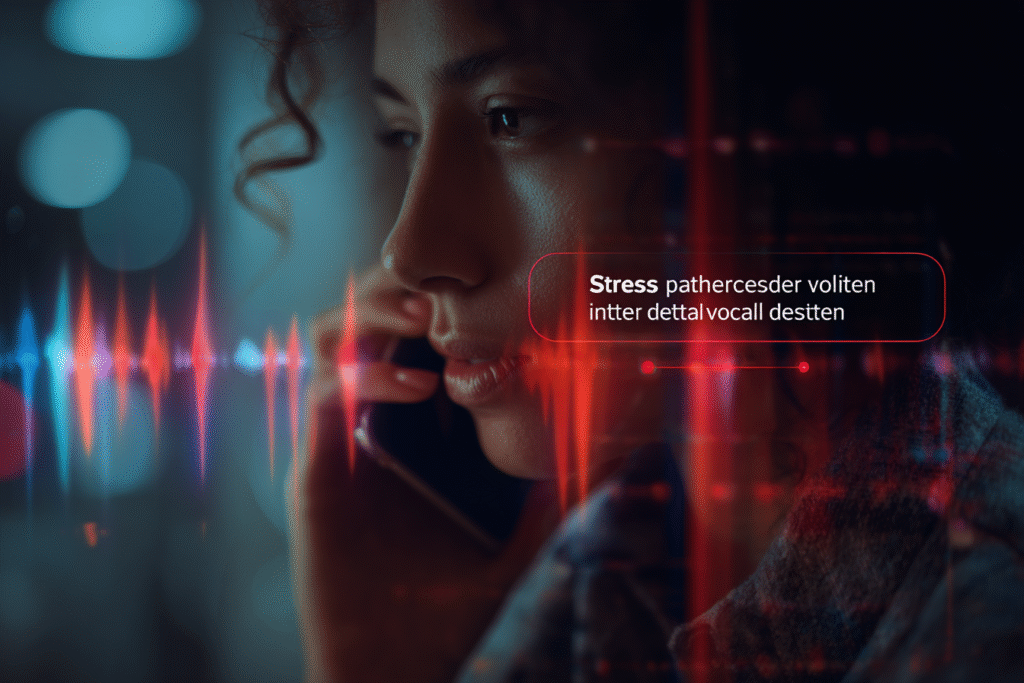The future of health isn’t in the technology we’re building, it’s in the consciousness we’re developing to use it.
Note: This article is for educational and informational purposes only. See full disclaimer at the end.
In fifty years, your great-grandchildren might look back at our current approach to health the way we look at bloodletting—not with ridicule, but with gentle amazement that we tried so hard with what we had.
We stand at a peculiar moment in human history. We’ve mapped the genome but struggle with sleep. We can replace hearts but can’t prevent most heart disease. We have AI that can detect cancer earlier than ever, yet we’re sicker than our grandparents were at our age. The future of human health isn’t about solving these paradoxes—it’s about transcending them entirely.

The Great Convergence
Three rivers of innovation are merging into an ocean of possibility. The first is our growing understanding of consciousness—not as some mystical concept, but as the fundamental organizing principle of biological systems. The second is artificial intelligence, evolving from a diagnostic tool into a true health partner that knows us better than we know ourselves. The third is what we might call “biological sovereignty”—the radical idea that individuals can and should own their health destiny rather than outsourcing it to institutions.
When these three converge, something remarkable happens. Health stops being something we manage and becomes something we embody. The distinction between prevention and optimization dissolves. The barrier between physical and mental health vanishes. The separation between individual and collective wellness becomes meaningless.
This isn’t speculation. It’s already beginning.
The Next Decade
The changes coming in the next ten years won’t look revolutionary—they’ll look inevitable. Your phone already tracks your steps. Soon, it will detect stress patterns in your voice before you feel them [1]. Your smartwatch measures heart rate. Tomorrow, it will predict illness days before symptoms appear [2].
But the real transformation won’t be in the technology. It will be in how we relate to it. We’re moving from reactive notification—”Your heart rate is elevated”—to predictive partnership—”Based on your patterns, taking a 10-minute walk now will prevent the afternoon energy crash you typically experience.”
The medical system will resist, then adapt, then transform. Doctors won’t become obsolete; they’ll become conductors of a health orchestra where AI handles the routine and humans handle the human. Emergency rooms will still save lives, but they’ll be surprised when someone arrives without months of predictive warnings from their personal health AI [3].
Insurance companies—those great resistors of change—will discover that paying for prevention algorithms costs less than paying for heart surgery. The economics of health will flip from treating disease to maintaining vitality. Not because insurance companies suddenly care about your wellbeing, but because the math will become undeniable [7].

The Twenty-Year Horizon
By 2045, the idea of one-size-fits-all health recommendations will seem as quaint as using leeches for fever. Your health protocol will be as unique as your fingerprint, built from the interaction of your genetics, your environment, your choices, and your circumstances.
This isn’t just about having a personalized vitamin regimen. It’s about understanding that your optimal sleep might be 7.3 hours while your partner thrives on 8.1. That your body processes caffeine in 2.5 hours while your colleague’s takes 6. That your stress response to public speaking actually enhances your performance while your friend’s degrades it [4].
The frameworks we use today—the general guidelines, the broad recommendations—will serve as starting points for AI systems that refine and adjust in real-time. “Eight glasses of water a day” will become “Your optimal hydration today, based on your activity, weather, and metabolic state, is 74 ounces, distributed according to this pattern.”
But here’s what’s truly revolutionary: This personalization won’t require constant attention. It will fade into the background of life, like breathing. Your environment will adjust to support your health automatically. Your schedule will organize itself around your biological rhythms. Your food choices will naturally align with your body’s needs, not through restriction but through genuine preference changes as your system rebalances [5].
The Fifty-Year Vision: Transcendence
Looking further ahead, the boundaries we take for granted today will dissolve. The distinction between treatment and enhancement will become meaningless. Why would we accept declining vision when we can maintain perfect sight? Why tolerate decreasing energy when we can sustain vitality?
Aging itself will become a choice rather than an inevitability. Not through some magical pill, but through the compound effect of thousands of micro-optimizations happening continuously, automatically, personalized to each individual’s biology [6]. We’ll look back at today’s approach to aging—accepting it as natural and inevitable—the way we now view societies that accepted childhood mortality as God’s will.
Communities will organize around health creation rather than disease treatment. Cities will be designed to promote movement, connection, and mental wellbeing. Architecture will incorporate circadian lighting as standard. Urban planning will prioritize air quality the way it currently prioritizes traffic flow [8].
The social dynamics of health will transform completely. Health optimization won’t be seen as vanity or privilege but as social responsibility—like not smoking in public spaces today. Parents will pass down health practices the way they pass down cultural traditions, except these traditions will be dynamically updated with each generation’s improved understanding.

The Challenges Ahead
But between here and there lie chasms we must cross.
The first is privacy. As our health becomes increasingly digitized and AI-analyzed, who owns that data? Who profits from it? How do we prevent a future where your health history determines your opportunities? These aren’t technical problems—they’re social and political ones that will require new frameworks for thinking about personal data sovereignty [9].
The second is inequality. Every health innovation starts expensive and exclusive before becoming accessible and universal. But the gap between early adopters and everyone else in health technology could create biological castes—those with access to optimization and those without. Preventing this requires intentional effort to democratize health technology, not as charity but as social necessity [10].
The third is meaning. If we can optimize away all discomfort, should we? If we can predict every health event, do we lose something essential about being human? These philosophical questions might seem abstract now, but they’ll become urgently practical as our capabilities expand.
The Path from Here
The future of human health isn’t something that happens to us—it’s something we create with every choice we make today. Each time you choose to track a biomarker, you’re training AI systems that will benefit millions. When you share what works for your health, you’re contributing to a collective intelligence that will outlive us all.
The path forward isn’t about waiting for breakthrough technologies or revolutionary discoveries. It’s about integration—weaving together what we already know into systems that support human thriving. It’s about recognizing that the future of health isn’t in hospitals or laboratories but in how we live our daily lives.
We’re the bridge generation—the ones who remember healthcare before AI, who experienced the transition from reactive to predictive medicine, who will teach our children that health is not the absence of disease but the presence of vitality.

Our Choice
Right now, at this moment, you’re living at the inflection point. The decisions you make about your health today aren’t just affecting your immediate wellbeing—they’re votes for the kind of health future we’ll create collectively.
Will you embrace personal health data sovereignty, or surrender it to institutions? Will you view AI as a tool for control or for empowerment? Will you see health optimization as individual achievement or collective responsibility?
These aren’t hypothetical questions. They’re being answered right now, with every health choice you make, every technology you adopt or reject, every conversation you have about what health means in the 21st century.
The future of human health won’t be determined by scientists in laboratories or executives in boardrooms. It will be determined by millions of individual decisions made by people like you, choosing to take ownership of their health story.
And that future? It’s not about living forever. It’s about living fully. Not about eliminating all suffering, but about making suffering meaningful. Not about perfect health, but about optimal vitality for whatever journey we choose.
The tools are emerging. The knowledge is accumulating. The systems are evolving.
The only question is: Will you be a passenger or a pilot in this transformation?
Because the future of human health isn’t something we’re moving toward—it’s something we’re creating with every breath, every choice, every moment of consciousness we bring to our embodied experience.
Welcome to the future. You’re already building it.
See you in the next insight.
Comprehensive Medical Disclaimer: The insights, frameworks, and recommendations shared in this article are for educational and informational purposes only. They represent a synthesis of research, technology applications, and personal optimization strategies, not medical advice. Individual health needs vary significantly, and what works for one person may not be appropriate for another. Always consult with qualified healthcare professionals before making any significant changes to your lifestyle, nutrition, exercise routine, supplement regimen, or medical treatments. This content does not replace professional medical diagnosis, treatment, or care. If you have specific health concerns or conditions, seek guidance from licensed healthcare practitioners familiar with your individual circumstances.
References
The references below are organized by study type. Peer-reviewed research provides the primary evidence base, while systematic reviews synthesize findings.
Peer-Reviewed / Academic Sources
[1] Dunn, J., et al. (2018). “Wearables and the medical revolution.” Personalized Medicine, 15(5), 429-448. https://www.futuremedicine.com/doi/10.2217/pme-2018-0044
[2] Topol, E. J. (2019). “High-performance medicine: the convergence of human and artificial intelligence.” Nature Medicine, 25(1), 44-56. https://www.nature.com/articles/s41591-018-0300-7
[3] Zeevi, D., et al. (2015). “Personalized Nutrition by Prediction of Glycemic Responses.” Cell, 163(5), 1079-1094. https://www.cell.com/cell/fulltext/S0092-8674(15)01481-6
[4] Berry, S. E., et al. (2020). “Human postprandial responses to food and potential for precision nutrition.” Nature Medicine, 26(6), 964-973. https://www.nature.com/articles/s41591-020-0934-0
[5] López-Otín, C., et al. (2023). “Hallmarks of aging: An expanding universe.” Cell, 186(2), 243-278. https://www.cell.com/cell/fulltext/S0092-8674(22)01377-0
Government / Institutional Sources
[6] Centers for Medicare & Medicaid Services. (2023). “National Health Expenditure Projections 2022-2031.” CMS.gov. https://www.cms.gov/research-statistics-data-and-systems/statistics-trends-and-reports/nationalhealthexpenddata/nationalhealthaccountsprojected
[7] World Health Organization. (2023). “Health and Well-being in Cities: The WHO European Healthy Cities Network.” WHO Regional Office for Europe. https://www.who.int/europe/initiatives/who-european-healthy-cities-network
Industry / Technology Sources
[8] Schuller, B. W., et al. (2021). “The INTERSPEECH 2021 Computational Paralinguistics Challenge: COVID-19 Cough, COVID-19 Speech, Escalation & Primates.” Proceedings of Interspeech 2021. https://arxiv.org/abs/2102.13468
[9] World Economic Forum. (2021). “Sharing Sensitive Health Data in a Federated Data Consortium Model: An Eight-Step Guide.” WEF Reports. https://www.weforum.org/reports/sharing-sensitive-health-data-in-a-federated-data-consortium-model-an-eight-step-guide
[10] Deloitte Insights. (2023). “2024 Global Health Care Outlook: The Evolution of Smart Health Care.” Deloitte. https://www.deloitte.com/global/en/Industries/life-sciences-health-care/analysis/global-health-care-outlook.html


